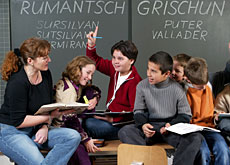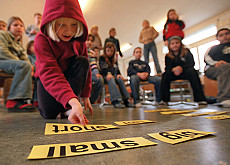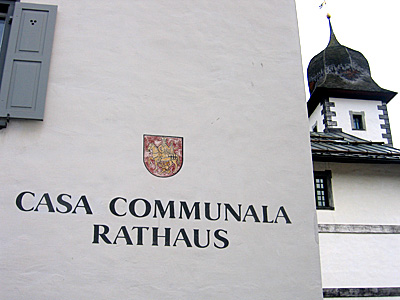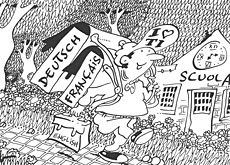English teaching divides Swiss parliament

The two chambers of the federal parliament are at odds over whether English should be made the first foreign language taught at schools.
The country’s cantons traditionally have far-reaching autonomy over language and education, which has led to some choosing English over one of Switzerland’s national languages.
The Senate on Tuesday decided against a clause in a new language law forcing schools to teach a second national language – German, French, Italian, Romansh – before English.
This goes against the House of Representatives, which last June gave national languages priority. The proposal will now go back to the house to be debated at a later stage.
A clear majority in the Senate said setting a mandatory nationwide priority went against the constitution and was irresponsible.
Most senators found an existing agreement among the 26 cantons providing for two non-native languages during the first six years of schooling was sufficient.
Anita Fetz, spokeswoman for the senate’s education committee, said cantons had spent millions harmonising the their syllabuses as well as their teacher training and should not be forced to overturn the previous reform.
Multilingual identity
Other speakers warned of a serious dispute over languages between the federal and cantonal authorities.
A minority favoured restrictions on English to ensure that Switzerland’s multilingual identity remained intact.
Interior Minister Pascal Couchepin – a native French speaker – said he trusted the German-speaking majority of the country not to unduly influence the rest of the country.
It is mostly German-speaking cantons which have favoured English as a first foreign language at schools.
The new law is part of a 1996 article in the constitution enshrining multilingualism as a key element of Switzerland.
Special provisions are included to promote the minority languages Italian and Romansh, including exchange programmes for pupils, students and teachers.
The federal authorities are also called upon to provide financial backing for multilingual cantons, such as Graubünden, Valais, Fribourg and Bern.
The government originally presented the proposal six years ago, but withdrew it later because of financial concerns.
English has been making inroads into the country’s universities as well, as a result of a more global outlook and the Bologna reforms.
swissinfo with agencies

More
Multilingualism
The debate in the Swiss parliament came ahead of European Day of Language on Wednesday.
The aim of the day – declared by the Council of Europe – is to draw the public’s attention to the linguistic wealth of the continent.
The organisers say the day is also a reminder of the need to learn other languages to better appreciate the value and benefits of our cultural diversity.
National languages:
German (63.7% of the population)
French (20.4%)
Italian (6.5%)
Romansh (0.5%).
Nine per cent of the population say their main language is not one of these four.
The Federal Constitution lays down the right to education and the obligation to attend school, but it is the cantons that are responsible for schooling.
This means there are currently 26 different education systems in Switzerland, although steps have been made to harmonise the system.
Most pupils start school at the age of seven, after one or two years of nursery school. They usually stay in school for nine years before going on to higher education or training.
Overall, cantons are permitted to take their own independent decisions when it comes to the structure of their education systems, syllabuses and the dates of school holidays.

In compliance with the JTI standards
More: SWI swissinfo.ch certified by the Journalism Trust Initiative



You can find an overview of ongoing debates with our journalists here. Please join us!
If you want to start a conversation about a topic raised in this article or want to report factual errors, email us at english@swissinfo.ch.